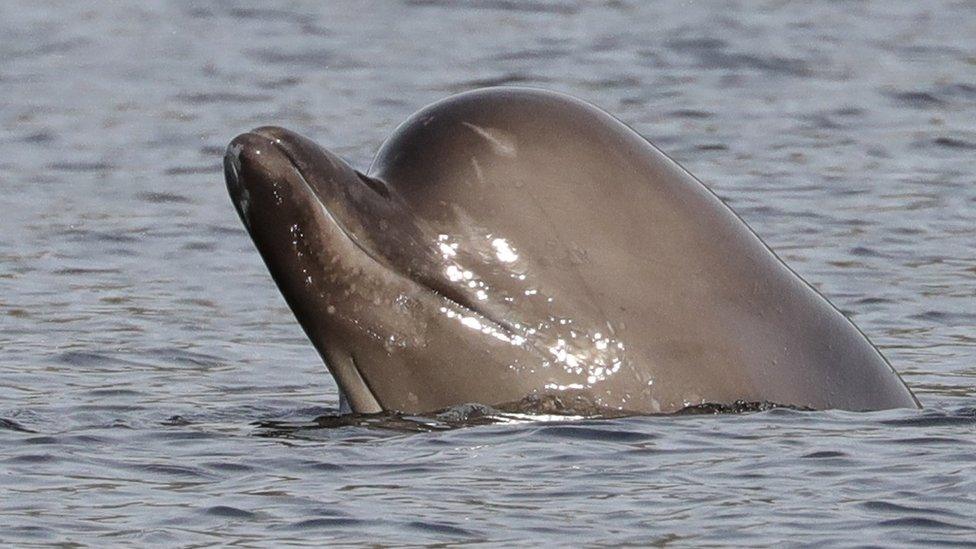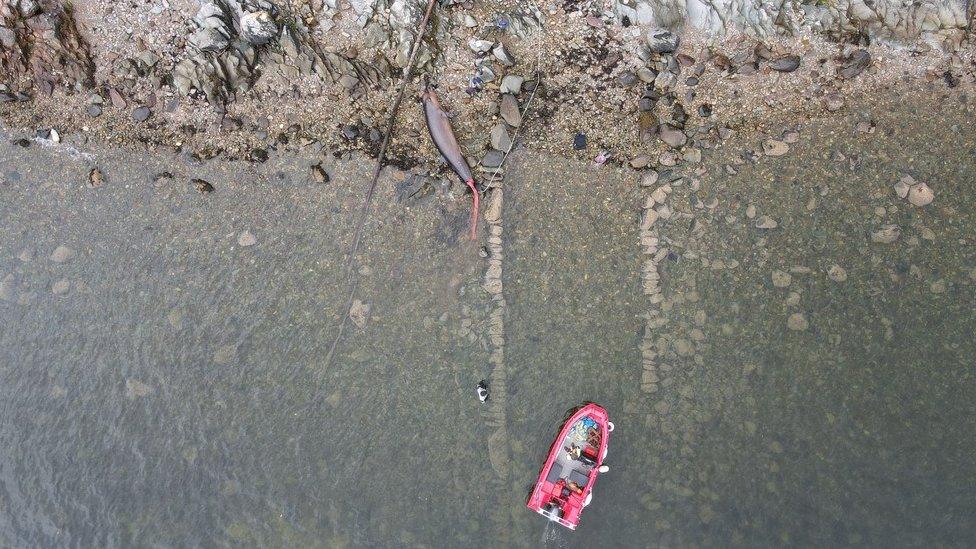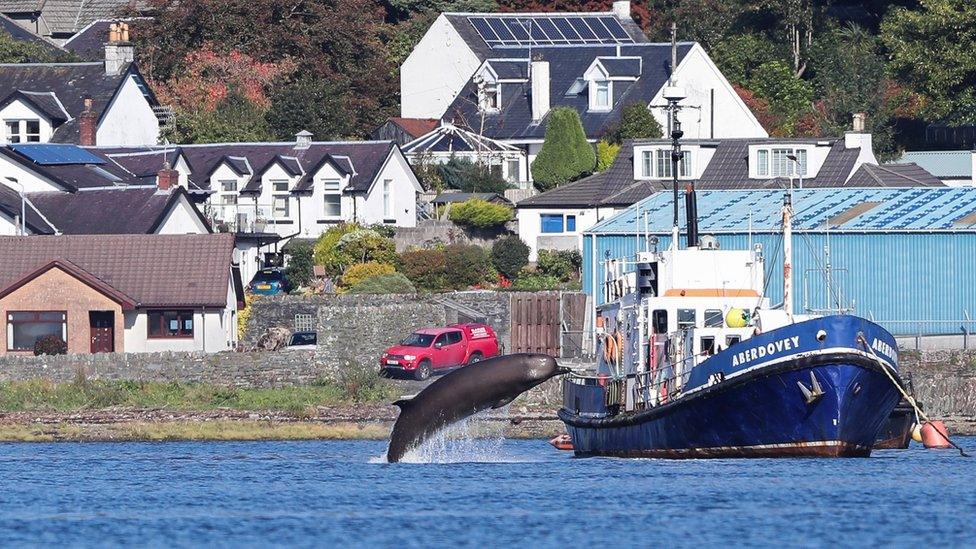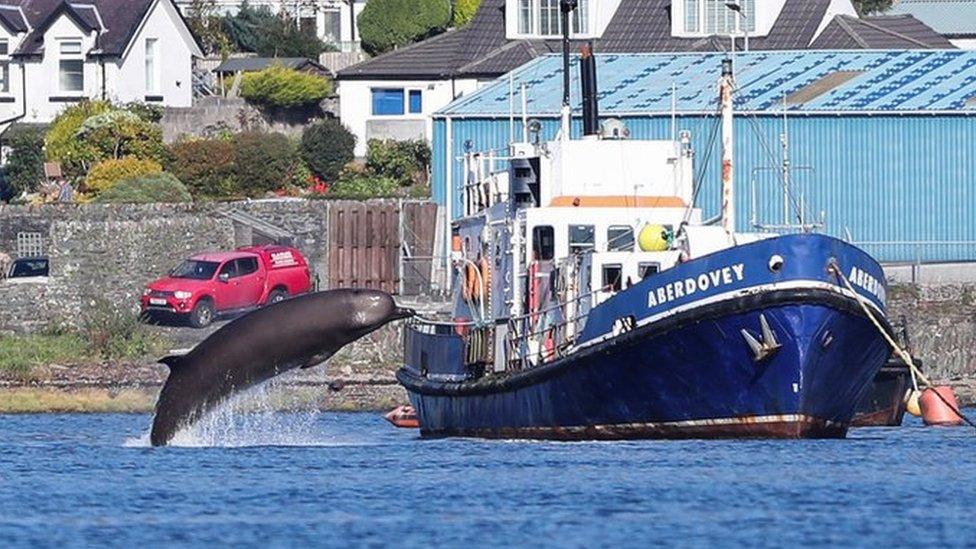Whale in Gare Loch rescue attempt found dead
- Published

Northern bottlenose whales were spotted in Gare Loch earlier this month
A whale which rescuers tried to "herd" from a loch before the start of a military exercise has been found dead.
Scientists have identified the animal as being part of a pod of northern bottlenose whales seen in Gare Loch in west Scotland earlier this month.
Rescuers had hoped the whales would swim out to sea before the start of major naval exercise Joint Warrior.
The dead whale is part of an "unusual cluster" of five recent deaths of deep-diving species on Scotland's coast.
Details about the deaths have come as rescuers attempt to save a sixth stranded whale.
The Maritime and Coastguard Agency said it was alerted to the northern bottlenose whale at Black Cart Water in the Clyde just before 11:00 on Monday.
Coastguard Rescue Teams from Greenock, Helensburgh and Ardrossan have been assisting a British Divers Marine Life Rescue (BDMLR) team.
The northern bottlenose whale found dead after previously being spotted in Gare Loch was already thought to be in poor condition prior to the start of Exercise Joint Warrior.
From 13 to 17 October, three northern bottlenose whales were found dead - two, including the one from the Gare Loch pod, stranded on coastlines of the Firth of Clyde while the other was discovered in the Western Isles.
Two Sowerby's beaked whales also died after stranding on the Lothian coast in east Scotland. All five had been alive when they had stranded.
Scientists investigating the deaths have asked the Royal Navy for information about naval sonar activity during Joint Warrior, which was held from 4 to 15 October and involved dozens of warships. The Royal Navy said it took its environmental responsibilities "very seriously".
Scottish Marine Animal Strandings Scheme (SMASS), which is part of Scotland's Rural College, said the Sowerby's beaked whales showed signs of possible decompression sickness - including an "unusually high number and distribution" of gas bubbles throughout the tissues of their organs - which could potentially be linked to disturbance to the animals caused by underwater noise.

An aerial image of the scene of one of the northern bottlenose whale strandings
The northern bottlenose whales were too decomposed to find out if they had been similarly affected, but there was no evidence of them having been struck by a boat or entangled in debris at sea.
SMASS said the whale previously seen in Gare Loch was in poor condition, suggesting it had not fed properly.
Northern bottlenose whales feed on deep-water squid and dive to depths of more than 1,400m (4,593ft) to find their prey in canyons in the Atlantic ocean.
'Looked skinny'
At the start of the month, volunteers from BDMLR made several attempts using small boats to herd the pod from Gare Loch, amid concern that they might be disturbed by the imminent naval manoeuvres.
The charity said it was also worried that the whales had spent a long time in the area - which is not their normal habitat - and that one of the whales looked "skinny".
But despite three attempts to move them, the whales returned to the loch.

Whales could still be seen in the area on Friday
Joint Warrior is one of Europe's largest Nato exercises and is held twice a year - in spring and autumn.
This year's first staging of the exercise was drastically pared down due to the Covid-19 pandemic with only a handful of countries involved and all the training was held at sea.
October's was held at a more typical level with thousands of military personnel and dozens of warships, with many of the boats gathering on the Clyde before joining the training off Scotland's coast.
The Royal Navy said it took its environmental responsibilities "very seriously" and environmental impacts were always considered in the planning of military exercises.
A spokeswoman said: "We have been approached by the Scottish Marine Animal Stranding Scheme to provide activity information related to Exercise Joint Warrior.
"We are in the process of collating relevant information and will provide this as part of our commitment to the UK Cetacean Stranding Information Programme."
- Published2 October 2020
